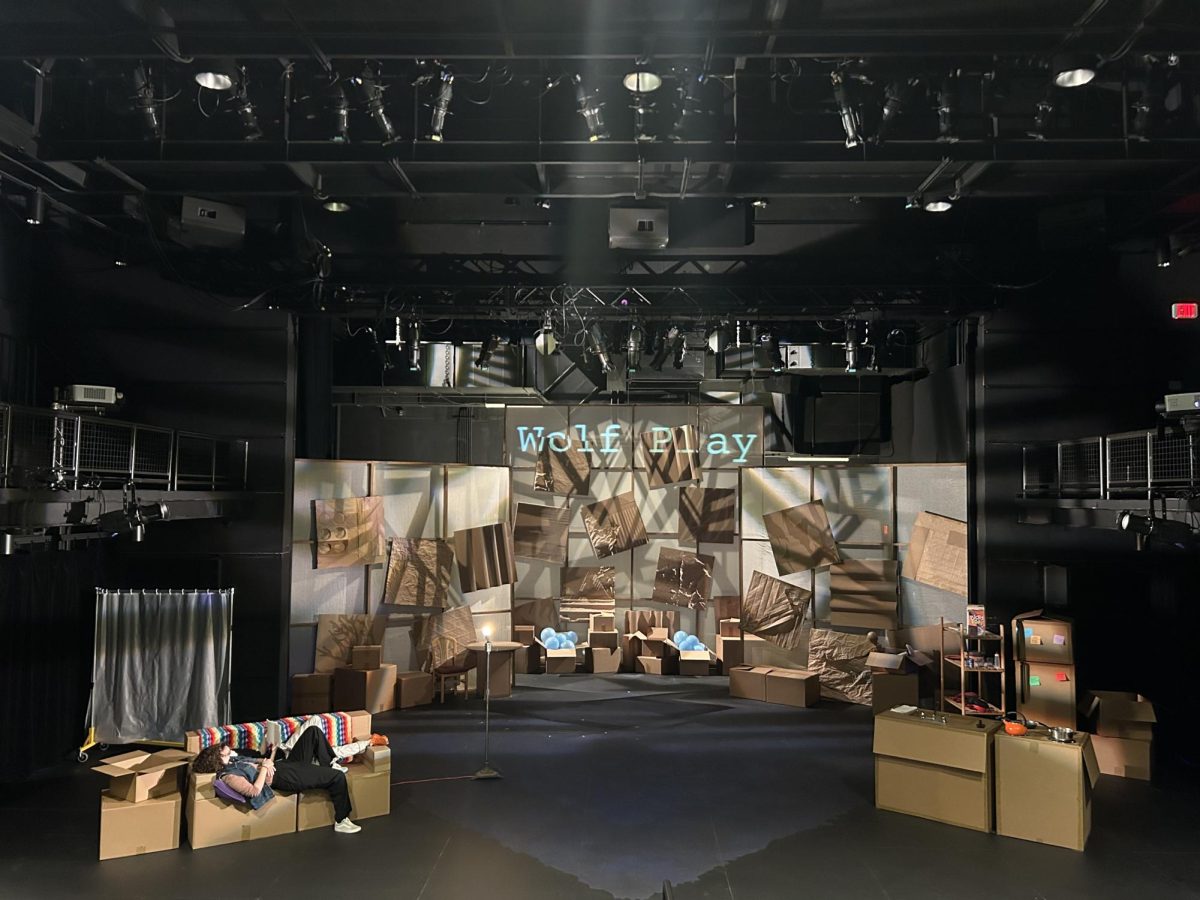“What if I said I am not what you see?” asks the first line of Wolf Play, a show following a six-year-old Korean-American boy adopted by an American family. The show opened in the Irene and Alan Wurtzel Theater, closing this past Sunday to a well-deserved standing ovation. The play starts with the adoptive father handing over the custody rights of the boy, known as Wolf, to a boxer and their wife. Upon realizing the couple is gay, the father protests, but it is too late. The crux of the emotional conflict is the adoptee at the center of it all as he adjusts to a new home for the second time, associating himself with a wolf to cope with the transition.
Wolf, played by College second-year Gabriel Semrau, opens the show with a monologue that sets the tone for the rest of the show through not only the words, but Semrau’s masterful direction of audience attention and emotion. Semrau directs the audience through an alternate reality where the floor is “forest earth,” and “to the left of that glaring exit light, a river flows, the width and length and velocity of the Egyptian Nile.” A light focused on his character whilst the panels in the back matched the fantastical imagery described. The focus quickly shifts as Semrau asks, “What if I said you are the single most important breath in my space?” He let silence fill the space, the audience waiting for his next words, and the tone quickly changed as he joked, “And you believed me? Does that change anything?”
From the moment Semrau takes the stage as Wolf, emulated by a cardboard puppet, he skillfully strikes the dichotomy of a narrator and a child in conflict. For its beady eyes and string hands, the puppet displays an extreme range of emotions. The visceral nature of watching a puppet reach for all he knows as his own father leaves him left me in tears. Semrau’s direction of the puppet and emulation of expression added to the emotionality of the puppet itself — Semrau, and the puppet, are transformed from college student and cardboard puppet yearning for his father, and what a simple and tender human emotion that is.
The set was designed entirely out of cardboard, which attested to the temporality of the house itself — the nature of “home” and “house” becomes provisional in the world of Wolf Play. The play has a limited cast of five characters, but the performances from each of the actors filled the space of the theater. College second-year Reyna Berry played the role of Robin, a woman constantly in conflict with those around her who struggles to connect with her wife, Ash, after the arrival of Wolf. Berry expertly navigated the guilt of a mother who only wants what is best for her son, but longs for connection. The relationship between College second-year Ethan Katz’s character Ash, partner to Robin and a boxer struggling to go pro, and Wolf is the heart of the play. Wolf reveals his name, Jeenu, to Ash when the two are alone. In a scene occuring after College fourth-year Danny Chan-Artiga’s character Ryan forces Wolf into the shower to “discipline” him, Ash and Wolf have an emotional heart-to-heart that reveals just how much love there is between the two of them.
Something that really stood out to me is the character of Katie. We never meet Katie, her character having no lines and is off stage, but we know so much about her not only from Wolf’s characterization of her —“Katies lie all the time” — but also from Conservatory second-year Calvin Ray Shawler, playing the adoptive father named Peter, arguments with her throughout the play. This powerhouse cast’s interactions with the “off-stage characters” made the world of Wolf Play seem much larger than just five people.
I particularly enjoyed the use of cameras and projections onto the back screen of the theater. This allowed for an interesting play with perspective where, on multiple occasions, a camera is used to project what Wolf is seeing onto the screen. Toward the end of the play, when a trial for custody is happening, all four adult characters fight, taking the camera from the floor and pointing it directly at Wolf, who is facing away from the audience. The projection of the character’s face onto the black screen — large, raw, childlike innocence being fractured by the custody battle and the fights in his own life — really struck a chord with me.
The structure of the play left no loose ends. The beginning — funny, effortless, “What if I said I am not what you think you see?” — Wolf, toying with the emotions of the audience, declares that “I need you with every blood cell and cranial nerve I possess,” and the audience doesn’t anticipate the mother in crisis who then appears on stages, showing us who the monologue is truly intended for. Berry’s delivery of the final monologue captivated the audience, and Wolf crawls up behind her — she would fight for him with “every cranial nerve,” “every blood cell,” and the audience is left with a truly masterful tale of family — who makes it, who chooses it, and what defines it.














